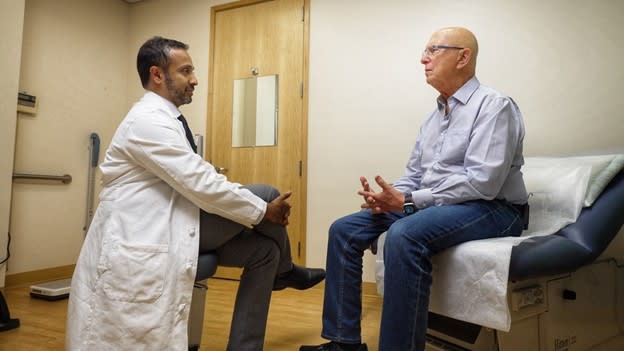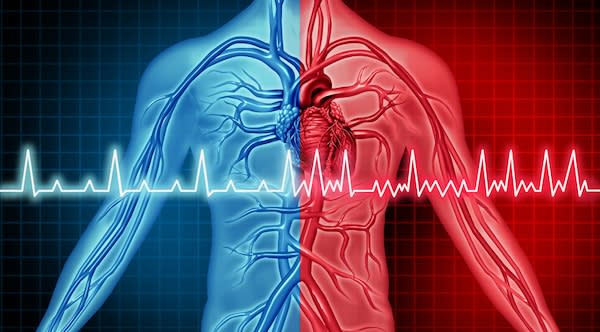Heart experts perform surgery for seminar audience
[3 MIN READ]
In this article:
-
Specialists from the Structural Heart and Valve Disease team at the Swedish Heart & Vascular Center recently repaired a patient’s leaky heart valve in front of a live audience.
-
This unique opportunity occurred at the annual Cardiovascular Research Technologies educational forum held in March in Washington, D.C.
-
Physicians on the team explain why such experiences improve care and help increase access to innovative procedures for patients everywhere.
Live demonstrations are not new to the typical conference or symposium. However, they usually involve PowerPoint presentations and laser pointers, not a team of cardiovascular experts using leading-edge technology to fix a leaky heart valve. But that's precisely what the international audience at a recent educational forum experienced, thanks to specialists from the Structural Heart and Valve Disease team at the Swedish Heart & Vascular Institute.
The annual Cardiovascular Research Technologies (CRT) educational forum in Washington D.C., features education and training sessions highlighting innovative clinical research and demonstrating the most up-to-date cardiovascular care techniques. This year’s event featured something new: live surgery and the opportunity for onlookers to ask questions as the procedure took place.
“This unique opportunity is given only to the highest quality and premier sites performing these types of procedures in the country. Of over 500 sites, less than 10% have been involved in mitral edge-to-edge procedures at this type of national or international conference,” says Sameer Gafoor, M.D., medical director of structural heart disease at Swedish.
Dr. Gafoor is part of the team of experts, including Santanu Biswas, M.D. and Sidakpal Panaich, M.D., who took part in this rare opportunity.
The unique experience was a valuable learning experience for everyone involved, according to Dr. Gafoor. “Live cases provide an opportunity for brand awareness, education, team culture building and a way to highlight the Swedish difference,” he explains.
Mitral transcatheter edge-to-edge repair (M-TEER)
The team demonstrated a mitral transcatheter edge-to-edge repair (M-TEER). This procedure is used to repair a mitral valve that is not closing correctly, a disorder called mitral valve regurgitation. During M-TEER, a small device is implanted in the patient’s mitral valve. This helps it close completely and restores proper blood flow, improving heart function and reducing shortness of breath and chest pain.
“There are four valves in the heart, and the mitral valve is one of them. Valves fail because they’re either too tight or too leaky. This patient’s valve was too leaky, so blood was backing up, causing significant shortness of breath,” says Dr. Panaich.
The procedure was successful and the patient was able to go home the same day.
Lights, camera, action
Watching the procedure as it occurs offers significant advantages to the audience, says Dr. Biswas.
“[It] allows the audience to understand the thought process of the heart team in real time. People can get an education through taped cases or procedures. However, this may not always show the important thought processes that take place at every single step. Sometimes, something may happen after step one, causing us to move towards step three or step four differently,” says Dr. Biswas.
“In a live case, you can go through all of that while it’s happening in real time, which is important for the audience to see. It’s like watching taped sports games versus sports in real time. There’s something about the real-time aspect of it that adds to the educational value for the audience,” says Dr. Biswas.
Viewers are encouraged to ask questions as the procedure takes place. “We respond to them in a manner that still enables the safety and proceeding of the procedure,” says Dr. Panaich. “One of the benefits of having multiple physicians present is that a core group can focus on the procedure, and one physician can interact with the panelists, answer questions and discuss some of the thought processes at each stage.”
Why Swedish?
“Swedish is one of the world leaders in transcatheter, mitral valve repair and therapy, often taking on procedures that are more complex or more high-risk than other centers. We have a long history of participating as faculty in multiple conferences, nationally and internationally,” says Dr. Gafoor.
“People had heard of our excellent clinical outcomes and significant experience. We participated as faculty of these courses at past conferences. This opportunity was extended to us, and thankfully, we were able to make it happen,” says Dr. Biswas.
Although the event required hours of planning and preparation, Dr. Panaich said the effort was more than worth it.
“Yes, we would do it again. It’s something that requires a significant amount of work for the team to do. But it also provides a significant amount of pride to know that we perform at a level that allows us to be a value for others,” says Dr. Panaich.
“That means that our work here doesn’t just help our patients but also helps patients across the nation and world, whom we may never interact with on a one-on-one basis. We take pride in knowing that the same way we learned is the same way we can help teach others,” says Dr. Panaich.
Learn more and find a practitioner
The team of specialists at the Swedish Heart & Vascular Institute has access to the latest treatments and technology and the expertise to know how to use it safely and effectively. Call 206-320-4100 to learn more about the vascular care we offer.
Whether you require an in-person visit or want to consult a doctor virtually, you have options. Contact Swedish Primary Care to schedule an appointment with a primary care provider. You can also connect virtually with your provider to review your symptoms, provide instruction and follow up as needed. And with Swedish ExpressCare Virtual you can receive treatment in minutes for common conditions such as colds, flu, urinary tract infections and more. You can use our provider directory to find a specialist or primary care physician near you.
Information for patients and visitors
Related resources
Providence Swedish team successfully implants first-of-its-kind device for heart valve repair
Revolutionary care for heart valve patients
Patient goes the distance for TAVR
This information is not intended as a substitute for professional medical care. Always follow your health care professional’s instructions.



